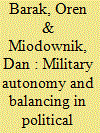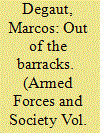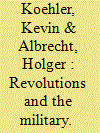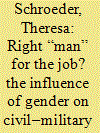|
|
|
Sort Order |
|
|
|
Items / Page
|
|
|
|
|
|
|
| Srl | Item |
| 1 |
ID:
185250


|
|
|
|
|
| Summary/Abstract |
What explains the post–Cold War surge in peacekeeping contributions from the developing world? I argue that, amid a wave of democratization and expanded peacekeeping activity, such countries use peacekeeping deployments to reduce the threat of the military to nascent democratic institutions. Peacekeeping participation serves to placate the military in the short term with resources and continued activity, while socializing and professionalizing it to pro-democracy behaviors in the long term. Assessing troop contributions from 1990 to 2011, I find evidence that new democracies make larger contributions than other states, where the effect diminishes as democracy becomes consolidated. Moreover, the effect is amplified in countries with a greater military legacy. I supplement this with a study of Argentina to further support the proposed mechanism. These findings help explain the shift in state peacekeeping contributions in recent years, the role of democracy in peacekeeping efforts, and the impact of international actors in supporting democratization.
|
|
|
|
|
|
|
|
|
|
|
|
|
|
|
|
| 2 |
ID:
163574


|
|
|
|
|
| Summary/Abstract |
It is paradoxical that authoritarian leaders often hold power for long periods of time, despite their states being plagued with rebellion. Scholarship has argued the practice of coup-proofing is potentially responsible for this trend. However, though regular armed forces are often allowed to whither when coup-proofing, states often retain substantial capabilities in the form of well-armed and well-trained coup-proofing units. This article argues that coup-proofing is more likely to contribute to rebellion when leaders are hesitant to deploy their coup-proofing units: when coup risk is high. Using a global sample of authoritarian regimes for the years 1971–2011, tests indicate that heavily coup-proofed regimes do in fact see a considerable increase in civil war likelihood when the risk of a coup is high but see no change in conflict propensity when coup risk is low.
|
|
|
|
|
|
|
|
|
|
|
|
|
|
|
|
| 3 |
ID:
177006


|
|
|
|
|
| Summary/Abstract |
This article argues that autonomous militaries can play a balancing role during major internal political crises. However, when militaries’ autonomy is curtailed by political leaders before the crisis, militaries cannot maintain the political balance between rulers and opponents, thereby increasing the risk of armed conflict. The article first explains the main concepts relevant to the discussion (autonomy, political crisis, balancing role), exploring their possible interlinkages and presenting several hypotheses. Subsequently, it discusses four relevant cases from the Middle East before and during the Arab revolts of 2010–2011: Egypt in 2011 and Lebanon in 1958, which demonstrate the balancing capacities of autonomous militaries during major political crises, and Lebanon in 1975 and Syria in 2011, which reveal that nonautonomous militaries cannot play a balancing role in such circumstances. The article concludes with several observations regarding the military’s balancing role during major internal political crises in divided and homogenous states.
|
|
|
|
|
|
|
|
|
|
|
|
|
|
|
|
| 4 |
ID:
163577


|
|
|
|
|
| Summary/Abstract |
Why some democratic revolutions succeed while others fail? The scholarly community has sought to address this issue from various perspectives, from rational choice approaches to collective action theories. Too little attention, however, has been paid to analyzing the role of the military. By discussing the different types of interactions played by the military in five cases of successful democratic revolutions—the 1910 Portuguese Republican Revolution, the 1958 Venezuelan Revolution, the 1960 April Revolution in South Korea, the 1989 Velvet Revolution in Czechoslovakia, and the 2000 Bulldozer Revolution in Yugoslavia—and three cases of failed revolutions, the 1905 bourgeois-liberal revolution in Russia, the 1989 Tiananmen Square Protests in China, and the 2016 Turkey’s coup attempt, this study finds out that the key factor in determining their outcome is the army’s response and that the military backing is a necessary condition for a democratic revolution to succeed.
|
|
|
|
|
|
|
|
|
|
|
|
|
|
|
|
| 5 |
ID:
169099


|
|
|
|
|
| Summary/Abstract |
Why would politicians recruit soldiers for military coups d’état? The civil–military relations literature assumes politicians aspire to supremacy over the military; enabling praetorianism would risk their future rule. While civil–military relations widely recognizes the empirical fact of civilian participation in military takeovers, no study specifies or theorizes the topic. This essay examines the conditions in which politicians recruit soldiers to seize power by investigating the understudied processes of military takeovers. Using British Foreign Office documents, Arabic language memoirs, and Polity data, I find that civilian statesmen in Iraq (1936) and Syria (1951) could not tolerate their civilian rivals’ incumbency but were unable to challenge them peacefully, so they recruited like-minded officers for coups. This suggests that while politicians do not necessarily want the army in the chambers, they sometimes favor praetorianism to the continued rule of their civilian opponents.
|
|
|
|
|
|
|
|
|
|
|
|
|
|
|
|
| 6 |
ID:
167828


|
|
|
|
|
| Summary/Abstract |
This essay is responding to Dr. Ionut Popescu’s review of the article “Saving Samuel Huntington and the Need for Pragmatic Civil-Military Relations.” He challenges the pragmatist outlook by questioning its usefulness to “manage relations between the military and its civilian superiors in a democracy such as the United States.” Based on the concerns of Morris Janowitz regarding military relations, three assertions are made in defense of the pragmatic approach. First, the choice between “professional versus civilian supremacy” for making crucial decisions during wartime is misleading because it is based on obsolete thinking from the twentieth-century Cold War. Second, types of wars waged are determined by complex and provisional decision-making processes amid political struggle. Third, Huntington’s civil–military theory wrongly maligns the word “politics” by distorting its meaning and purpose. Politics is a natural process and an essential feature of democracy.
|
|
|
|
|
|
|
|
|
|
|
|
|
|
|
|
| 7 |
ID:
177007


|
|
|
|
|
| Summary/Abstract |
This article presents a systematic analysis of military coups following popular mass uprisings in nondemocratic regimes, conceptualized as endgame coups. Drawing on our original, medium-n data set of revolutionary situations, we find that such endgame coups form a distinct type of military intervention in politics. Compared to regular coups, episodes of popular mass contestation prompt conservative interventions in politics of the military’s leadership aimed at preserving the regime’s authoritarian infrastructure. A systematic test of factors characterizing postcoup political trajectories is based on Cox proportional hazard models and provides empirical evidence in contrast to the widely held notion of “democratic coups.” Our findings reveal that endgame coups are conservative rollback coups, executed by military leaderships, that result in continued political instability and illiberal politics.
|
|
|
|
|
|
|
|
|
|
|
|
|
|
|
|
| 8 |
ID:
160625


|
|
|
|
|
| Summary/Abstract |
The purpose of this study is to investigate the impact of women in politics on the risk of a coup d’état. Previous research indicates that the relationship between female political leaders and security is dependent on the office she holds. Subsequently, we expect female legislators to have a different influence than a female chief executive on the likelihood of a coup. We argue that a higher level of female representation reduces the risk of a coup d’état. However, we assert that a female chief executive has a different effect and increases coup risk. Using data covering 160 states over the years 1952 to 2009, our empirical tests provide support for our expectations. All else being equal, increased levels of women in parliament lead to a substantial drop in coup likelihood. However, the argument that a female chief executive will be more coup prone is not fully supported in our findings.
|
|
|
|
|
|
|
|
|
|
|
|
|
|
|
|
|
|
|
|
|